How to properly store onions: at what temperature and under what conditions
Everyone knows how healthy onions are and how many vitamins they contain. Summer is coming to an end, summer residents harvest and are thinking about how to preserve this vegetable until next year. It’s not difficult to save it, the main thing is to know the features and nuances of storage.
How to prepare onions for storage
To preserve the onion, it is necessary to properly prepare it for harvesting. The preparation rules are simple, but will help in preserving the harvest.
- To begin with, stop watering a month before harvest, so that during storage the vegetables do not begin to rot from excess moisture.
- Harvest only after the stems have dried and fallen to the ground.
- Cleaning is carried out in dry weather.
- The bulbs are carefully removed from the ground without damaging them.
- Be sure to dry the onions for several days after harvesting. This can be done by laying it out on the garden bed, and if the weather does not permit, then in a dry, bright place with good ventilation. If dried well, the vegetable will be stored for a long time and will not rot.
- After a few days, check the neck of the bulb. It should be dry, and the onion itself should be hard.
- Clean off excess scales trim roots and stems. If you don’t braid it, leave the stems at least 5 cm.
After all these steps, the crop can be harvested long-term storage.
What conditions are required for storing onions?
When the crop is harvested and prepared, care must be taken to provide it with conditions for long-term storage.If you do not think through this stage, the harvest will not last longer than a couple of weeks, its quality and the quantity of preserved onions will decrease.
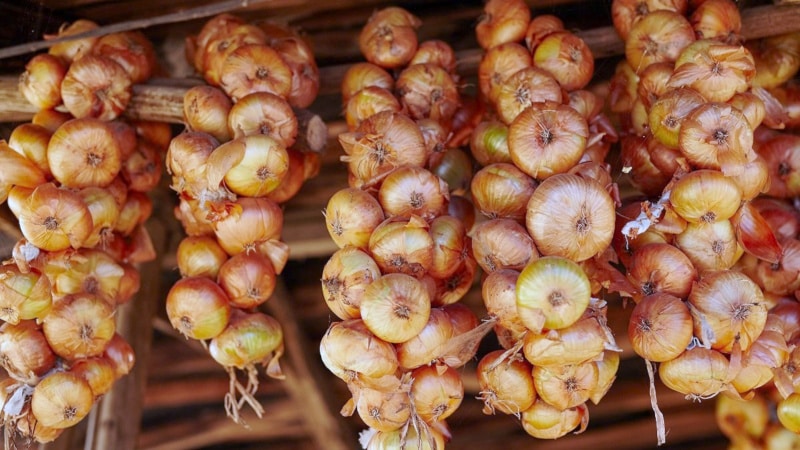
Optimal
The optimal temperature is from +2 to +5°C. This temperature is easier to maintain in a basement or cellar.
Try to maintain humidity at the same level, no more than 75%. High humidity provokes germination and rotting of onions, and low heads will cause them to dry out.
Darkness and protection from the sun will be the most suitable conditions.
There must be constant air circulation in the storage room. If the air stagnates, it will not be possible to preserve the crop for a long time.
Minimum allowable
If you do not have a cellar or basement, you can store the harvest in a living room at a temperature not exceeding 18°C. This vegetable also tolerates indoor storage, but then one should not allow fluctuations in humidity and temperature, which are inevitable when central heating is turned on and off.
If it is impossible to ensure darkness in the room, then at least prevent direct sunlight from entering the storage areas.
If there is no ventilation in the room, ventilate it regularly.
Be sure to periodically inspect the bulbs and remove any that begin to deteriorate.
What problems can you encounter during storage?
Every summer resident wants not only to harvest the crop, but also to preserve it for as long as possible. Some problems may arise during the storage process, which can be avoided if you are aware of them.
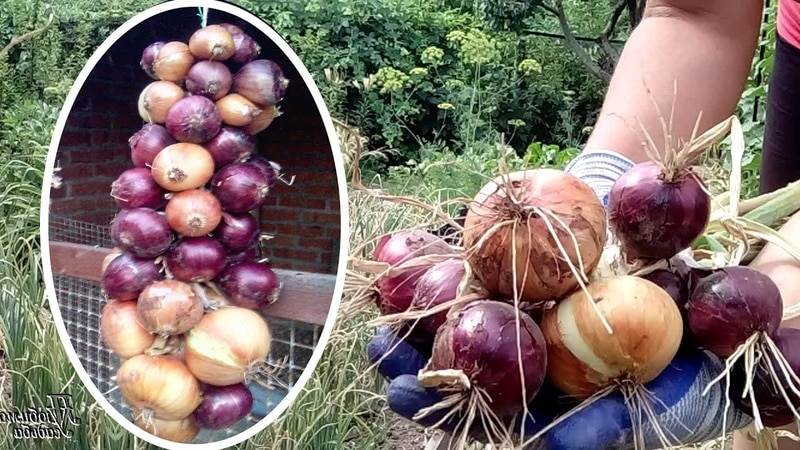
Why onions can rot
Many people face this problem. There are several factors that can cause rotting:
- Improper cleaning. If the bulbs have been mechanically damaged and not removed from the general mass, the affected area can become a source of disease.At the same time, healthy vegetables located next to it will also suffer.
- Storage conditions. If the room temperature changes, this can cause condensation to form, which promotes rot. At high temperatures and humidity, onions begin to sprout and rot. If the temperature is too low, the bulbs freeze and when thawed they also begin to rot.
- Variety selection. If you are going to grow a large crop, then choose for long-term storage late-ripening varieties with increased keeping quality.
If you have already noticed that the onion has begun to rot, it is recommended to sort it out, remove all excess scales, dry it again if possible and well ventilate the room in which it is stored.
You can additionally sprinkle the bulbs with crushed chalk, which will absorb unnecessary moisture. Take 200 g of chalk per 10 kg of onion.
What to do if midges appear over onions
Onion midges can appear from improper storage of various products, including onions. They pose no harm to humans, but being around them is unpleasant in any case. It is not difficult to distinguish them from other insects; they are small in size, from 1 to 3 mm, and have a yellow-brown color.
Important! They begin to fight them as soon as you notice the first midge. They multiply in a few days and immediately move on to other perishable vegetables and fruits, cereals, pots with indoor plants, and also sweets.
There are several ways to combat onion midges:
- First of all, be sure to sort through all the onions and throw away spoiled vegetables.
- Use sticky fly traps.
- Place pine needles or cotton wool soaked in essential oil next to the onion.
- Place an open bottle of unfinished wine or sweet drink into which midges will fly. Then close it and throw it away.
- Midges do not tolerate the smell of camphor, garlic or cloves. Place cloves of garlic nearby or heat a little camphor in a frying pan, creating a kind of “smoking”.
The onions began to sprout
There are several reasons why onions sprout during storage:
- with the onset of spring, natural processes are activated;
- storage in a warm room with high humidity;
- The thick neck of the bulb can contain a large amount of moisture, which also promotes germination.
At the first signs of germination, remove the bulbs to a room with a lower temperature, this will slow down the growth process or stop it completely.
Attention! Not peel the onion from scales, in this form it quickly leaves the dormant state and germinates.
If you store onions in cardboard boxes with a closed lid, a favorable microclimate is created there, thanks to which the onions are stored longer and do not germinate.
Storage methods
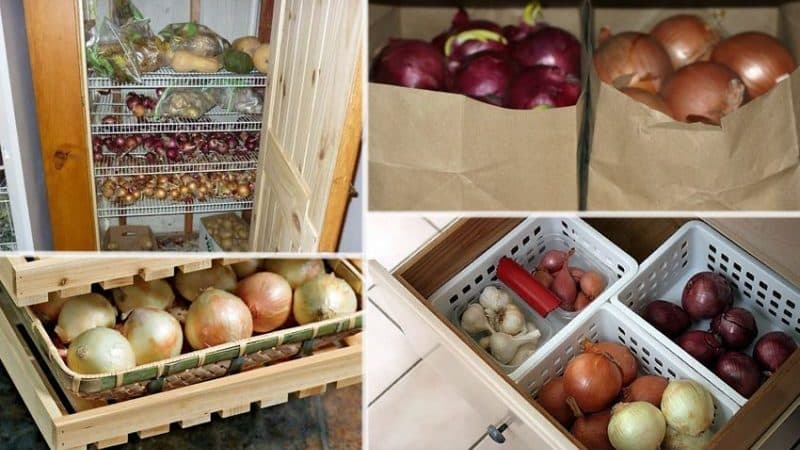
Where and how to store onions depends on the quantity and your capabilities. Regardless onion varieties dryness and cool air with moderate humidity are needed.
Important! Do not store onions in plastic bags under any circumstances; they begin to rot in them after just a few days due to the lack of air exchange and the formation of a favorable environment for the growth of bacteria.
Cellar
If you decide to store onions in the cellar, prepare in advance the boxes or bags in which you will put the onions.
- You can place the onions in cardboard or wooden boxes with holes, approximately 50 cm high. Boxes should not be used higher; the lower layers can quickly begin to deteriorate.The box should stand on a hill so as not to touch the walls and floor. Place paper or newspaper at the bottom of the box to absorb moisture.
- Choose bags or nets made of strong material, placing 10-15 kg of onions in each.
- Egg containers. This unusual method is also suitable for storage; here you can place each onion in a separate recess.
- Nylon stockings. They allow air to pass through perfectly: bulbs placed there will be well stored.
- Scythe. Convenient and beautiful way of storage. Heads with a stem of at least 15 cm are used; for convenience, it is better to choose bulbs of the same size. Braids can be hung both in the cellar and at home.
To eliminate excess moisture in the cellar, it is recommended to place containers with ash and not throw away crumbling onion peels, which, like ash, absorb excess moisture.
At home
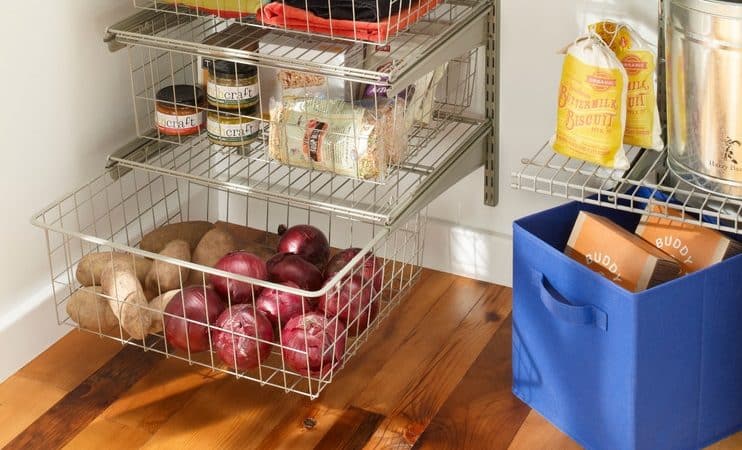
If you don’t have a cellar for storing vegetables, apartment conditions are quite suitable.
- The most important thing is choosing a suitable storage location. It should be cool and dry and located away from various heating devices.
- Be sure to ensure air circulation in the room.
- Avoid direct sunlight, as this will cause the bulbs to dry out.
- The best place for storage will be in the pantry, but in this case it is necessary to limit the proximity to carrots, beets or potatoes. It is better to place the onion closer to the garlic.
- You can store onions on the balcony only until cold weather sets in; in winter they will freeze there. In addition, temperature changes on the balcony are more noticeable than in the apartment, and this will not benefit the onion. If you have an insulated balcony specifically designed for storing vegetables, it will be quite suitable.
- For daily use, keep some onions in a drawer in the kitchen; nothing will happen to them in a week or a week and a half.
- It is not recommended to store in the refrigerator.
Tips and tricks
Gardeners have experimentally discovered which varieties of onions are stored longer and retain their appearance and taste.
- For example, red salad onions quickly deteriorate and rot. Therefore, it is better not to leave it for long-term storage, but to eat it first.
- Regular onions, familiar to us, can be stored longer than other varieties because they have a dense outer shell. In addition, it is unpretentious when grown.
The method of planting onions also affects the shelf life. Onions grown from sets will last longer. For these reasons, it is not recommended to plant onions with seeds.
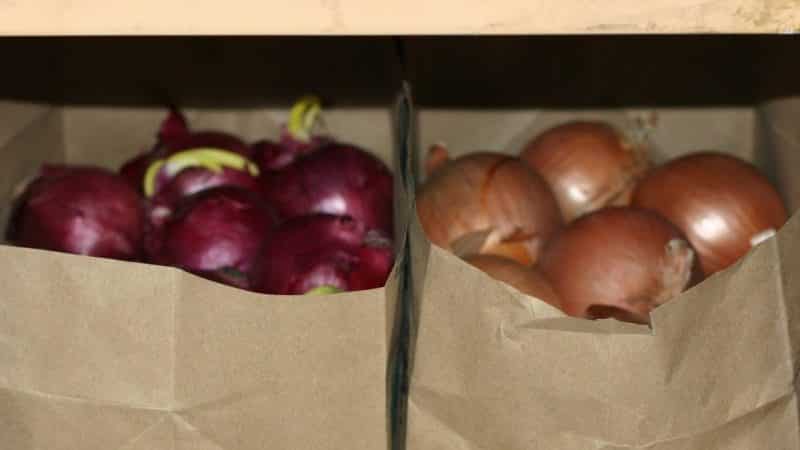
The variety also affects the duration of storage.
- the most “vigorous” onions are more resistant to various diseases and rotting;
- a sweeter vegetable, on the contrary, has a shorter shelf life and is easily susceptible to disease.
Also, first of all, it is recommended to eat those bulbs that are smaller in size than others; they spoil faster.
Conclusion
Onions in general do not require special care. The main thing is to properly prepare it for storage, maintain the required temperature and humidity in the room, and be sure to periodically inspect the crop to identify spoiling bulbs. These recommendations will help you preserve your harvest and enjoy the beneficial properties of onions all winter.